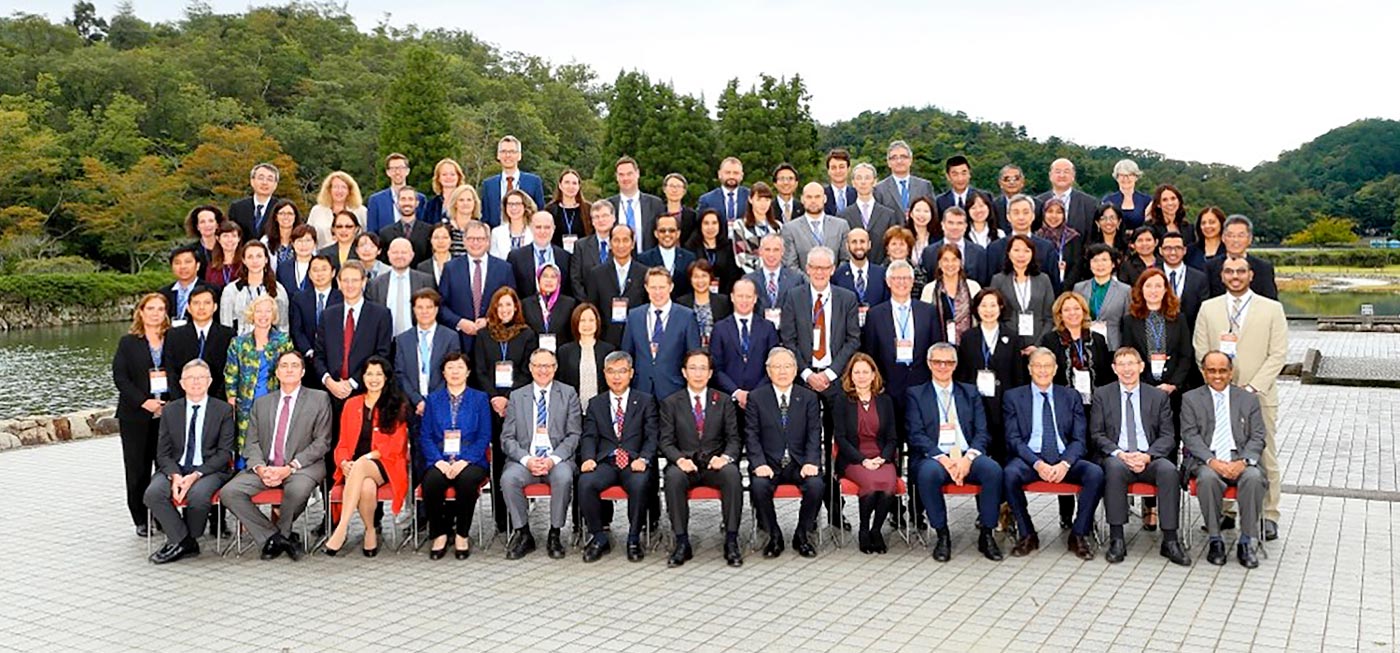Regulatory Science
Innovation, Cooperation, Efficiency: Kyoto Summit of Heads of Medicines Regulatory Agencies and ICMRA
Written By
Nobumasa Nakashima
Office Director for International Regulatory Affairs, Ministry of Health, Labour and Welfare (MHLW); Executive Committee Chair, Summit of Heads of Medicines Regulatory Agencies Symposium
Edited By
Junichi Nishino
Global Forum
Japan Regional Editor

Leadership from the public Summit Symposium.
n October 2017, the 12th Summit of Heads of Medicines Regulatory Agencies and the International Coalition of Medicines Regulatory Authorities (ICMRA) convened in Kyoto, with regulatory authority representatives from 29 countries and regions, including China, Europe, and the US, attending.
The Summit was initiated in 2006 to facilitate an exchange of opinions among the regulatory agencies from 23 countries and regions around the world. This was the first Summit to be held in Japan. Since 2012, ICMRA has branched off from the Summit to conduct international cooperation projects, and has created supply chain, post-marketing safety measures, and crisis management working committees. The next combined ICMRA Summit will be held in the US.
During this summit, Japanese regulatory authorities also held bilateral meetings with nine other countries and regions (EMA, Poland, Denmark, England, Saudi Arabia, US, Myanmar, South Korea, and Indonesia), and agreed on strengthening collaboration.
To provide a flash report from these meetings, a public Summit Symposium was cohosted at the same Kyoto venue as the Summit by the MHLW, PMDA, Kyoto Prefecture, and DIA Japan. This symposium welcomed approximately 1500 attendees from industry, government, and academia, and discussed the following topics.
Regulation of Regenerative Medicines
Many countries have not yet structured an adequate regulatory system for regenerative medicines. National regulation may need to evolve to appropriately reflect the special characteristics of these products. Participants agreed to promote international regulatory convergence through and by existing organizations such as the World Health Organization (WHO), International Council on Harmonisation (ICH), and the International Pharmaceutical Regulators Forum (IPRF).
Real-World Data
Participants discussed how to translate real-world data into real-world evidence for regulatory decision-making in the face of collection, standardization, validation, verification, and other challenges.
Fight Against Antimicrobial Resistance
Participants emphasized the importance of establishing guidelines on clinical evaluation for expediting the development of antibacterial agents against drug-resistant microbes, and promoting the monitoring of use of antimicrobial agents.
Counterfeit Drug Countermeasures
It will be necessary to consider developing the technology and databases required for the Track and Trace system (T&T) and promoting inter-agency collaboration. WHO will have a role in monitoring substandard and falsified products.
Keynote Address
Professor Shinya Yamanaka, who received the 2012 Nobel Prize in Physiology or Medicine in 2012, spoke about Recent Progress in iPS Cell Research and Application. Professor Yamanaka emphasized the impact of regulatory and cost issues on the application of stem cell technology in medicine to all regulatory leaders in attendance.
Author’s Commentary:
“I want to offer my personal thanks. In organizing this summit and symposium, I was made intensely aware of three directions in the future of international regulatory affairs. First, strengthening responses to innovative technology; the ICMRA ‘horizon scanning project’ is of particular symbolic significance in this regard. Second, advancing the efficiency of regulatory affairs. The topic of reducing drug costs also must be addressed in order to ensure patient access to medical products. Finally, including these two directions, bringing international harmonization and international cooperation to a new level. I look forward to cooperating with all of the national and regional regulatory authorities that were involved with this symposium and to all of you in DIA and industry as you respond to these directions.”
Other Commentary:
Kazuhiko Mori, Minister’s Secretariat of the Ministry of Health, Labour and Welfare (MHLW) and Symposium Senior Advisor: “The Kyoto Summit and ICMRA meeting clearly showed the passion of participants to improve the health and hygiene of their citizens, and their willingness and hard work to embrace the need for greater international cooperation and harmonization. One very important result of this symposium was to share the results from the Summit and ICMRA with industry and academia. Based on the results from the Kyoto Summit, we will strive to further promote international cooperation among national and regional regulatory authorities and stakeholders, and to advance the practical application of medical innovations.”
Kazumichi Kobayashi, DIA Japan Regional Advisory Committee Chair and Summit Symposium Co-host: “I was honored to play a part in co-hosting this memorable and important Summit Symposium. DIA Japan is very proud of the success of this event, and we are also tremendously grateful to the MHLW and PMDA for allowing us this valuable opportunity.”

